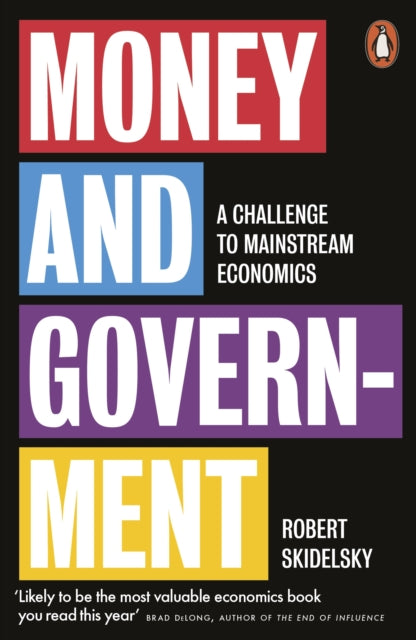Robert Skidelsky
Money and Government: A Challenge to Mainstream Economics
Money and Government: A Challenge to Mainstream Economics
YOU SAVE £3.72
- Condition: Brand new
- UK Delivery times: Usually arrives within 2 - 3 working days
- UK Shipping: Fee starts at £2.39. Subject to product weight & dimension
Bulk ordering. Want 15 or more copies? Get a personalised quote and bigger discounts. Learn more about bulk orders.
Couldn't load pickup availability
- More about Money and Government: A Challenge to Mainstream Economics
In his book "The End of Money and the Future of the World," Robert Skidelsky argues that money and government are essential features of any market economy due to uncertainty. Keynesian economics emerged as the new policy paradigm in the Western world after the Great Depression, but the 2008 global financial crash led to a return to small-state neoclassical orthodoxy. This book aims to familiarise the reader with Keynes's "big idea" and encourage economists to break free from their conceptual prisons and give money and government the starring roles they deserve in the economic drama.
Format: Paperback / softback
Length: 512 pages
Publication date: 05 September 2019
Publisher: Penguin Books Ltd
In his remarkable work, Robert Skidelsky brings together his extensive experience, profound knowledge, and exceptional talents to provide a comprehensive and insightful exploration of money and power. This book challenges the prevailing economic view, which suggests that money and government should play only a minor role in economic life. According to this dominant perspective, money is merely a medium of exchange, and economic outcomes are best left to the invisible hand of the market to determine. However, the author argues that the omnipresence of uncertainty necessitates the essential presence of money and government in any market economy.
One of the primary reasons why money is necessary is the inherent unpredictability of the future. We cannot know with certainty what events or circumstances will unfold, which creates a demand for financial resources to prepare for potential risks and uncertainties. Good government, characterized by effective policies and institutions, plays a crucial role in making the future more predictable and reducing this demand for money. By implementing policies that promote stability, growth, and social welfare, governments can alleviate the concerns of individuals and businesses about the future, thereby reducing their reliance on money as a means of protection.
After the dominance of Adam Smith's orthodoxy, which advocated non-intervention, the Great Depression of 1929-32 brought about a significant shift in economic thinking. The crisis exposed the limitations of orthodox economic theories and paved the way for Keynesian economics to emerge as the new policy paradigm of the Western world. Keynesian economics emphasized government intervention to stimulate economic growth and address unemployment. Through fiscal policies, such as government spending and taxation, Keynesian economists aimed to stabilize the economy and restore prosperity.
However, the stagflation of the 1970s led to the rejection of Keynesian policy and a return to small-state neoclassical orthodoxy. This shift was driven by concerns about high inflation and government debt, which some argued were the consequences of excessive government intervention. Despite the global financial crisis of 2008, which shook the re-vamped classical orthodoxy, the pre-crash orthodoxy was reinstated, albeit undermined but unbowed. Since 2008, there has been a lack of a new "big idea" that could challenge the prevailing orthodoxy, and orthodoxy has maintained its sway, enacting punishing austerity agendas that have left the global economy still anaemic.
This book aims to familiarize the reader with the essential elements of Keynes's "big idea." By demonstrating that much of economics can be understood through the lens of Keynesian theory, the author seeks to provide a fresh perspective on economic policy and offer solutions to the challenges facing the global economy. The book explores the role of money in the economy, the importance of government intervention, and the challenges of managing economic uncertainty. It also examines the historical development of economic thought and the influence of key figures such as Adam Smith, John Maynard Keynes, and Milton Friedman.
In conclusion, Robert Skidelsky's work is a groundbreaking exploration of money and power. It challenges the dominant economic view and emphasizes the essential role of money and government in any market economy. By showing that much of economics can be understood through the lens of Keynesian theory, the book offers a fresh perspective on economic policy and provides solutions to the challenges facing the global economy. It is a must-read for anyone interested in understanding the complex relationship between money, power, and economic outcomes.
Weight: 350g
Dimension: 131 x 197 x 22 (mm)
ISBN-13: 9780141988610
This item can be found in:
UK and International shipping information
UK and International shipping information
UK Delivery and returns information:
- Delivery within 2 - 3 days when ordering in the UK.
- Shipping fee for UK customers from £2.39. Fully tracked shipping service available.
- Returns policy: Return within 30 days of receipt for full refund.
International deliveries:
Shulph Ink now ships to Australia, Belgium, Canada, France, Germany, Ireland, Italy, India, Luxembourg Saudi Arabia, Singapore, Spain, Netherlands, New Zealand, United Arab Emirates, United States of America.
- Delivery times: within 5 - 10 days for international orders.
- Shipping fee: charges vary for overseas orders. Only tracked services are available for most international orders. Some countries have untracked shipping options.
- Customs charges: If ordering to addresses outside the United Kingdom, you may or may not incur additional customs and duties fees during local delivery.


